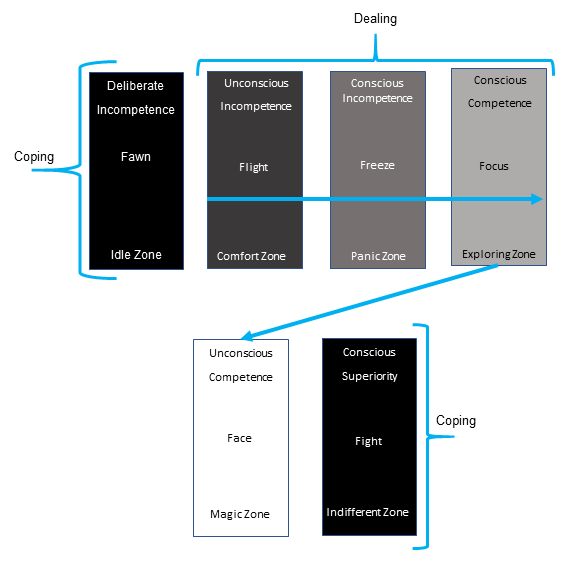We are all aware of the four stages of learning, or the ‘Four levels of teaching’, as Martin M. Broadwell, management trainer, described the model. Later, Paul R. Curtiss and Phillip W. Warren mentioned the model in their book, The Dynamics of Life Skills Coaching. The model was used by Noel Burch, an employee at the Gordon Training International, in the 1970s. There, it was called the “Four stages for learning any new skill’.
The four stages of learning are:
i. Conscious incompetence
ii. Conscious competence
iii. Unconscious incompetence
iv. Unconscious competence

However, in my 30 years of experience in coaching and people development, I have observed this model stretching beyond the four stages.

The new stages are that of Deliberate incompetence and Conscious superiority.

As you can see from the diagram, one of these two stages occurs at the beginning and the other at the end. We will examine only these two zones —idle zone and indifferent zone — in this article.
Deliberate incompetence / idle zone
This is a stage of idling and can been seen in a number of people. In this stage, people are very conscious of what they must do but they will not do it. They choose to stay deliberately incompetent.
They do so largely due to external reasons:
For instance, they may think they are already old and there is no purpose in doing anything now; or they may be aware of what is to be done, but push it down their list of priorities due to other commitments; or they may not do it because of lack of support from anyone else; or they may just be unable to do it because of absence of resources.
People in the deliberate incompetence phase use the ‘fawning’ strategy largely to get themselves out of trouble. “Fawn types seek safety by merging with the wishes, needs and demands of others,” according to Pete Walker, the therapist who coined the concept of fawning as the fourth ‘F’. In his own words, “They act as if they unconsciously believe that the price of admission to any relationship is the forfeiture of all their needs, rights, preferences and boundaries.”
In my experience, these people have dreams but will not take action to realise those dreams. They end up stressed and go into complaining mode. Largely, no type of learning or coaching works with this group.
For instance, an individual who may be aware that he has to learn to cook, but instead, overcomes the challenge by ordering food from outside or hiring a maid; or an individual who knows he will be better off if he learns the basics of troubleshooting for a laptop or PC, but finds it easier to just get someone else to do the troubleshooting; or an individual who knows he has to use the online banking or payment systems, but issues cheques instead.
Counselling or therapy is required to move such people from ‘coping’ to ‘dealing’.
Conscious superiority
This is the stage where the person has mastered the skill of protecting himself from new learning. This stage is applicable to both the individual and the group. Because of this, many new approaches and inventions take time to get accepted in the existing fields. It causes people to become indifferent and more arrogant. They become conscious of their superiority and are blinded by it.
Emerging developments remain invisible to them! Therefore, they fight the new development by labelling this as impossible.
Both these changes need a coaching style which is more about instructing, structuring, describing, directing, and so on.
Coaching is defined by the International Coaching Federation (ICF) as “partnering in a thought-provoking and creative process that inspires the clients to maximise their professional and personal potential”.
A professional coach is a partner who shines a light in disruptive times when certainty fails. It is a thought and accountability partner and a catalyst that supports his clients in reaching the clarity of their goals and helping them mapping out the way to achieve them.
ICF Professional coaches guarantee confidentiality, empathy, clarity and professionalism for clients. They are trained in recognising whether support, other than coaching, is needed and can offer such resources through referrals.
Professional coaching services can be found using ICF’s directory of credentialed coaches spread all over the world
The International Coaching Federation (ICF) is the world’s largest organisation leading the
global advancement of the coaching profession and fostering coaching’s role as an integral part of a thriving society. Founded in 1995, its 35,000-plus members located in more than 140 countries and territories work toward the common goals of enhancing awareness of coaching and upholding the integrity of the profession through lifelong learning and upholding the highest ethical standards.
Through the work of its six unique family organisations, ICF empowers professional
coaches, coaching clients, organisations, communities and the world through coaching.
In India, ICF is represented by six vibrant chapters, all led by volunteering professional coaches — ICF Bengaluru, ICF Chennai, ICF Delhi, ICF Mumbai, ICF Pune and ICF Hyderabad.
 The author, Krishna R Ramamurthy aka Krish, is a professional certified coach from the International Coach Federation (PCC). He holds an executive master’s degree in Neuroleadership and Polyvagal Theory informed Trauma, Assessment and Intervention & Clinical Application of Polyvagal Theory. Krishna is a practising executive coach with more than 8000 hours of coaching experience. He is also a coach, mentor and trainer and has so far helped the certification of more than 100 coaches through the ICF – ACTP pathway.
The author, Krishna R Ramamurthy aka Krish, is a professional certified coach from the International Coach Federation (PCC). He holds an executive master’s degree in Neuroleadership and Polyvagal Theory informed Trauma, Assessment and Intervention & Clinical Application of Polyvagal Theory. Krishna is a practising executive coach with more than 8000 hours of coaching experience. He is also a coach, mentor and trainer and has so far helped the certification of more than 100 coaches through the ICF – ACTP pathway.
Value our content… contribute towards our growth. Even a small contribution a month would be of great help for us.
Since five years, we have been serving the industry through daily news and stories. Our content is free for all and we plan to keep it that way.
Support HRKatha. Pay Here (All it takes is a minute)
Coinsmart. Beste Bitcoin-Börse in Europa
Source: https://www.hrkatha.com/special/coaching-and-training/six-stages-of-learning/




